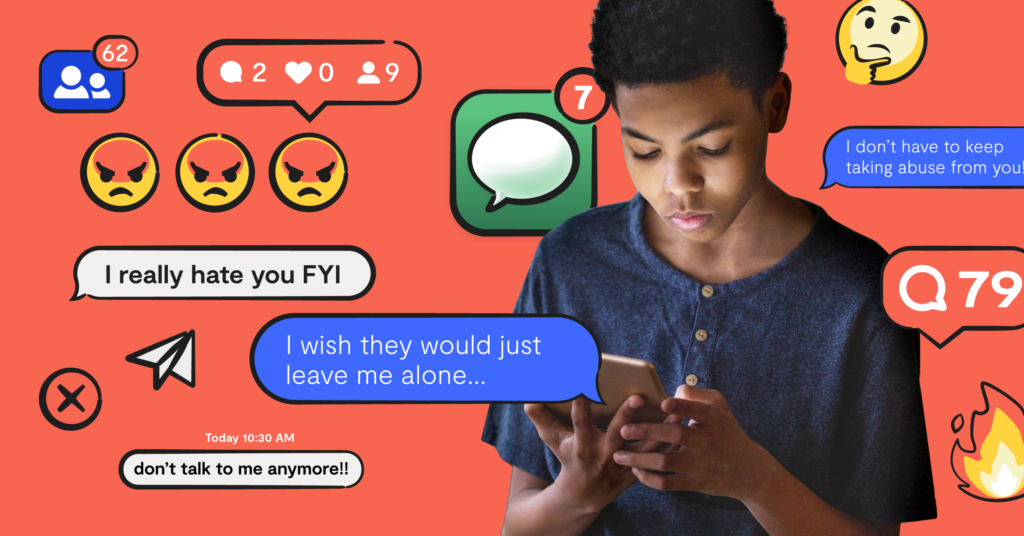
Every parent is tasked with the difficult job of keeping their kid safe from the dangers of the world. Some things are easy, like keeping them safe from sickness by getting them a flu shot. But others are more complicated and just plain scary to think about — things like domestic violence and cyberbullying.
While they are hard to think about, these two things are all too common among children and adults alike. The sad truth is that more than 12 million people around the world are impacted by domestic violence every year. Nearly half of the teens in the United States state that they’ve experienced some form of cyberbullying.
These stats can be startling to hear. Often, we live by the rule of out of sight, out of mind when it comes to these things.
But even if your child has never or will never experience an incident of domestic abuse, it can still be impactful for parents to know to better support their child. If anything, it’ll only help contribute towards building a safe space at home and in the digital world.
In this article, we’ll cover some of the important relationships between domestic violence and cyberbullying. You’ll also learn key signs to look for when it comes to cyberbullying as well as get tips to navigate cyberbullying as a parent.
What Is Domestic Violence?
Domestic violence is the violence that takes place between people who have an intimate relationship with one another. But this violence is more than just aggressive behavior between two people. It’s a pattern of behavior that’s typically used to exercise power over another person.
Domestic violence appears in many different forms – some are easier to notice than others. This includes physical abuse and sexual assault, but also emotional abuse and other forms of intimidation, like exerting financial control.
Domestic violence is much more common than we might think. Almost 50% of all men and women in the United States have experienced some sort of domestic psychological aggression in their lifetime.
Victims of domestic violence often experience an impact on their mental health and stress levels. It can also affect their physical health, even when physical violence isn’t involved.
But domestic violence doesn’t just impact the victims or people involved. It can have long-term implications for their friends, loved ones, and even children.
The Effects Of Domestic Violence On Children
Domestic violence isn't just an adult problem. Unfortunately, it’s a reality for many children. They might witness it in their home, or they may have even unfortunately experienced it themselves.
Almost a quarter of domestic abuse cases have been witnessed by children. While a large percentage of abusers also have a history of abusing children in the household. This doesn’t even account for the cases that never get reported.
Children exposed to violence often carry mental, emotional, and physical damage into their teenage years and beyond. This damage can often manifest in other aspects of their lives.
And one little-known or talked about result of domestic violence in children is actually cyberbullying.
What Is Cyberbullying?
For many parents, cyberbullying is still a relatively new concept. Most likely, it’s something you never experienced growing up.
Unlike traditional playground bullying, cyberbullying happens in the digital world. From social media to texting – technology has given bullying a whole new space to fester.
The ability to hide behind a screen has made it possible for bullies to act in ways they never have before. You still see things like harassment, intimidation, and threats. However, the internet has made way for new forms of social exclusion, impersonation, doxing, and other types of psychological harassment.
And if you have spent any time browsing the comment sections of social media, this won’t come as a shock — the internet can be a downright mean place sometimes!
Cyberbullying Among Children And Teens
Cyberbullying is much more common among teens and older children as they start to explore the digital world.
On the surface, cyberbullying may seem less harmful than your child returning home with a black eye. But the impacts of cyberbullying can be equally — if not more — dangerous.
The digital nature of cyberbullying means it’s much harder to detect in multiple ways. For one, it’s harder to know it’s happening at all since it may never manifest off the screen. Secondly, even if you know it’s happening, you may not be able to detect who the actual bully is. Unfortunately, it’s quite easy to remain anonymous online. And the bully may not even be someone from school or someone your child knows in real life, which makes resolving the situation extremely difficult or even impossible sometimes.
How Domestic Violence Impacts Cyberbullying
Domestic violence and cyberbullying alone can be detrimental to the mental and physical health of your child. And the two are more connected than one might think.
When children are around domestic violence, there is a chance they’ll be more susceptible to cyberbullying. Depending on the child, it can result in them being more likely to be bullied or more likely to be a bully. For many, it might be both.
Let’s break down some of the ways exposure to domestic violence can impact how a child could encounter cyberbullying:
Increased trauma
It’s natural for a child to have a trauma response to interactions with domestic violence. This is true whether they’re a victim or a bystander.
Trauma can often make it difficult for children to regulate their emotions. It can lead to difficulty forming healthy behaviors or relationships. This can make them more prone to aggressive behavior, including cyberbullying.
Trauma can also make children more withdrawn, meaning they’ll shy away from sharing any difficult experiences with you. Unfortunately, this can make it more difficult to identify instances of bullying.
Low-self esteem
Low self-esteem and self-worth are commonly attributed to bullies. But it can make children more vulnerable to being bullied or being a bully.
Interactions with domestic violence could make a child feel like they don’t deserve to be treated fairly, and receiving threats or intimidation is acceptable. Or their lack of self-esteem might cause them to resort to bullying in order to make themselves feel better.
Poor communication skills
Children take their cues from their parents and those around them. If they’ve been exposed to domestic violence, they’ve been shown that intimidation, aggression, and even violence are normal ways to communicate.
These poor communication skills and lack of boundaries can make it hard to understand what makes appropriate behavior. This causes them to resort to bullying tactics when approaching conflict or difficult situations.
For many children, it can also cause them to accept being bullied as the norm. They may also lack resilience and may not know how to cope with difficult situations, making them more likely to be bullied.
Difficulty expressing and understanding emotions
Children exposed to domestic violence may have trouble showing their true emotions. This can make it difficult to make friends or connect with classmates.
Even though it’s not healthy, cyberbullying is often a way for these children to express pent-up emotions.
On the other hand, it can also make it difficult for them to empathize with others. For some, this means it can be challenging to recognize the effects of their bullying behavior. For others, it just makes it difficult to build relationships – making them prone to being bullied.
Decreased or increased trust
Trust is a key element to building a healthy relationship.
Experiencing domestic violence can also cause children to develop trouble trusting those around them. This can include anyone from authority figures or even other children.
But some victims of domestic violence can experience the opposite effect, where they are overly trusting. Which might make them a target for cyber bullies.
Fear and anxiety
For children who show bully-like behavior, aggressive behavior is often how they try to make themselves feel safe. Being scary or having a targeted victim can make them feel more powerful and less vulnerable.
And when it comes to victims of bullying, their fear and anxiety may cause them to be afraid to speak out for fear of retaliation from the bully.
The Effects of Cyberbullying on Children Exposed to Domestic Violence
Ultimately, cyberbullying makes the victim feel isolated and alone. Coupled with the impact of domestic violence, it can potentially cause lasting damage.
Here are some common effects of cyberbullying on children exposed to domestic violence:
- Increased risk of mental health issues, including anxiety and depression
- Lack of healthy relationship building
- Signs of pessimism and low optimism
- Decreased trust in authority figures
- Poor or decreasing academic performance
- Higher risk of suicide
Signs your child may be experiencing cyberbullying
When it comes to cyberbullying, one of the best things you can do is recognize the signs. This way, you can get your child the support and help they need as soon as possible.
If your child has been exposed to domestic violence, here are some signs of cyberbullying to keep an eye out for:
- Sudden hesitation or reluctance to use digital devices
- Not wanting to go to school
- Loss of friends or other relationships
- Unexpected behavior (including acting out, and being withdrawn)
- Change in eating or sleeping habits
- High-levels of stress
Victims of bullying are often very good at keeping it to themselves. They may be embarrassed or simply do not wish for others to get involved. Anytime you see abrupt changes in behavior, you should be mindful of potential bullying.
Cyberbullying and traditional forms of bullying may come hand in hand, so make sure to keep an eye out for signs of in-person bullying as well.
Signs your child may be cyberbullying others
It can be difficult to think about your child or teenager being a bully. As a parent, it can be easy to turn a blind eye.
But seeing the signs sooner rather than later means you can help to course correct them before any more damage is done.
- Aggressive or intimidating behavior
- Lack of respect toward you or other authority figures
- Hiding digital activity and history
- Lack of consideration for those around them
- Getting into physical altercations
- Constantly reminding others of their own accomplishments
- Signs of money or cash with no plausible story
Not all children necessarily recognize their own bullying behavior. It can be a difficult conversation to have, but addressing these challenges can help your child’s development.
Protect Your Children From Cyberbullying
The link between domestic violence and cyberbullying is clear. So, of course, the best-case scenario is to remove any exposure to domestic violence. However, instances of domestic violence often happen when least expected. It may also be something of the past that can’t be changed.
Whether your child has experienced domestic violence or not, here are some steps you can take to protect your child from cyberbullying.
- Work with a professional: Domestic violence is serious stuff. If your child is showing signs of trauma or other distress as a result of domestic violence, a professional can help your child work through the emotions. They can also provide resources for you and your family to work together.
- Foster communication with your child: Building trust with your child means that they’ll be more likely to share challenges with you. This can be as simple as them letting you in on their day or sharing how they’re coping with their history of domestic abuse. Having a line of communication open with your child makes it easier to see potential issues when they arise. Plus, it also helps you build a stronger relationship with your kid!
- Limit exposure to instances of cyberbullying: If you know that your child is being bullied or is bullying others, sometimes it’s easier to cut it at the source. You can limit access to specific apps and websites, the internet, or even their devices.
- Monitor digital activity: Use tools like Bark that can help you keep an eye on your child’s digital footprint. Not only can you track the sites and conversations they’re having, but you can detect things like inappropriate behavior. You can set up alerts for content monitoring, so you get notifications the moment they encounter cyberbullying.
We hope this served as an informative resource for you in thinking about domestic violence and cyberbullying. Both can have serious consequences, so understanding the links and being well-equipped as a parent is crucial should anything come your way.
If you, your child, or someone you know is experiencing domestic violence, visit resources like the National Domestic Violence Hotline or contact your local authorities.
Create a safe space for your child online with Bark. Start your free trial today.
Read more
Bark helps families manage and protect their children’s digital lives.




